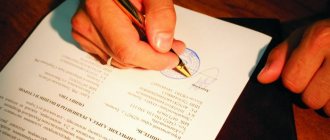New edition of Art. 207 Code of Criminal Procedure of the Russian Federation
1. If the expert’s conclusion is insufficiently clear or complete, as well as if new questions arise regarding the previously investigated circumstances of the criminal case, an additional forensic examination may be ordered, the production of which is entrusted to the same or another expert.
2. In cases where doubts arise about the validity of the expert’s conclusion or there are contradictions in the conclusions of the expert or experts on the same issues, a repeat examination may be ordered, the production of which is entrusted to another expert.
3. Additional and repeated forensic examinations are appointed and carried out in accordance with Articles 195 - 205 of this Code.
Commentary on Article 207 of the Code of Criminal Procedure of the Russian Federation
1. The commented article establishes the possibility of ordering additional and repeated forensic examinations. The main difference between them is that an additional forensic examination does not cast doubt on the evidentiary value of the expert’s conclusion, and a repeat examination is carried out precisely if there are doubts about the validity of the expert’s conclusion or in cases where the expert’s conclusions contain contradictions.
2. The resolution to order an additional forensic examination contains new questions that specify those previously posed to the expert or the answers to which make it possible to establish new circumstances that are important for the criminal case. Since the additional forensic examination is based on the findings of the initial one, its production is entrusted to the same expert.
3. The grounds for ordering an additional forensic examination in accordance with Part 1 of the commented article are insufficient clarity or completeness of the expert’s conclusion or the emergence of new questions in relation to the previously investigated circumstances of the criminal case. Insufficiency is understood as the impossibility of understanding the meaning and significance of the terminology used by the expert, the research methodology, the meaning and significance of the signs identified during the study of objects, the criterion for assessing the identified signs that cannot be eliminated by questioning the expert who carried out the examination in a court hearing. An incomplete conclusion is one that does not contain answers to all the questions posed to the expert and does not take into account circumstances that are important for resolving the questions posed.
4. The decision to order a repeat forensic examination contains the same questions that were posed to the expert earlier. When ordering a repeat forensic examination, the investigator must motivate his disagreement with the expert’s initial conclusion. The execution of a repeated forensic examination is always entrusted not to the expert who carried out the initial examination, but to another person.
5. A resolution to order an additional or repeated forensic examination must contain the specific basis for the decision, the formulation of the questions, as well as a list of materials and items that are transferred to the expert’s disposal.
6. The court has the right to order a repeat forensic examination if, during the trial, it establishes that the experts’ conclusions raise doubts about its correctness or contradict the circumstances of the criminal case.
Everything about criminal cases
Go to the text of the Code of Criminal Procedure
Url Additional information:
I). Additional expertise
- Part 1 207 Code of Criminal Procedure
Additional examination is prescribed in the following cases:
- Part 1 207 Code of Criminal Procedure
if the conclusion is not clear enough
- Part 1 207 Code of Criminal Procedure
if the conclusion is insufficiently complete
- Part 1 207 Code of Criminal Procedure
if you have any new questions
- Part 1 207 Code of Criminal Procedure
additional examination is entrusted to the same or another expert
II). Re-examination
- Part 2 207 Code of Criminal Procedure
A re-examination is ordered in the following cases:
- Part 2 207 Code of Criminal Procedure
if there is any doubt about the validity
- Part 2 207 Code of Criminal Procedure
if there are contradictions in the expert’s conclusions
- Part 2 207 Code of Criminal Procedure
re-examination is entrusted to another expert
Plenum of the Supreme Court
Plenum
N 28 appointment of additional and re-examination
Article 207 of the Code of Criminal Procedure. Additional and repeated forensic examinations
Url Additional information:
- Part 1.2 144 Code of Criminal Procedure
the right to a second examination (after the initiation of the case)
- part 1 206 of the Code of Criminal Procedure
the right to apply for additional examination
— clause 13
Plenum No. 28 appointment of additional examination
— P.
Plenum No. 51 ambiguity, incompleteness, new questions - additional
1) Additional forensic examination may be ordered:
Url Additional information:
— clause 13
Plenum No. 28 lack of clarity: terminology, methods, meaning
— if there is
insufficient clarity,
Url Additional information:
— clause 13
Plenum No. 28 is incomplete: not all questions, circumstances not taken into account
— or
insufficient completeness of the expert’s opinion,
Url Additional information:
- paragraph 14
Plenum No. 28 on new issues is chaired by the same expert
- and also if new questions arise in relation to previously investigated circumstances of the criminal case, an appointment may be made,
The production of additional expertise is entrusted to the same or another expert.
Url Additional information:
- part 1 206 of the Code of Criminal Procedure
right to apply for re-examination
- paragraph 15
Plenum No. 28 appointment of a re-examination
— P.
Plenum No. 51 repeated: doubts, contradictions, violation of rights
2) A re-examination may be ordered in the following cases:
Url Additional information:
- paragraph 15
Plenum No. 28 unfounded conclusion
— doubts arise about
the validity of the expert’s conclusion,
— the presence of contradictions in the conclusions of the expert or experts.
The re-examination is entrusted to another expert.
Url Additional information:
- Part 1.2 144 Code of Criminal Procedure
the right to a second examination (after the initiation of the case)
3) Additional and repeated forensic examinations are appointed and carried out in accordance with Articles 195 of the Code of Criminal Procedure - 205 of the Code of Criminal Procedure.
Return to the text of the Code of Criminal Procedure
Seek advice
What needs to be done to schedule a re-examination
A repeated judicial examination under the Code of Civil Procedure of the Russian Federation and other procedural codes can be ordered either at the initiative of a law enforcement officer (judge, investigator), or at the request of persons participating in the case.
The procedure for appointing an expert examination in civil proceedings Read more
A request to order a re-examination must be justified, since disagreement with the expert’s conclusions in itself does not entail the court’s obligation to order a re-examination.
Study of the primary expert opinion
Before applying for a review of the primary expert report and applying for the appointment of a repeat expert study, we recommend that you study the primary examination yourself. When studying the document you should check:
- Have the requirements of procedural law been met when ordering and conducting a study: has the examination been carried out by a person subject to disqualification on the grounds listed in the procedural law, has the procedure for obtaining samples for research been violated, have the requirements for drawing up an expert’s report been met, have all the details been indicated? etc.
- Is the expert competent and competent to answer the questions posed? As a rule, specialists attach copies of documents confirming their qualifications to the examination. The absence of such documents allows one to doubt the expert’s competence.
- Have all the questions been examined by the expert, how well do the answers correspond to the questions asked, are the answers complete, clear and comprehensive. Any deviations are grounds for doubting the expert’s conclusions;
- Do the expert’s conclusions contradict the conducted research?
- What methods were used to conduct the study. The conclusions drawn can be called into question if the expert used outdated or ineffective methods and guidelines.
Note! Often the parties justify their request for the appointment of a PE by the fact that the expert’s conclusions are probabilistic. However, the probabilistic form of conclusions is not a basis for prescribing a PE, unless, when assessing the conclusion, doubts arise regarding the scientific validity of the examination or the competence of the expert.
Preparation of a review for the initial examination
Note! The court evaluates the expert opinion according to its internal conviction, therefore the activity of the parties in arguing for the appointment of a re-examination is very important.
To substantiate its position, the party requesting the examination has the right to review the primary expert opinion.
The review is an analysis of the primary expert opinion: the methods used by the expert, the completeness of the research, the validity of the conclusions.
The review is an optional document. Its necessity in a specific case is dictated by the impossibility of setting out in the petition the technical details of the violations committed by the expert. You can entrust the writing of the review to available relevant specialists. There are also expert organizations that specialize, among other things, in writing reviews.
The prepared review (sometimes called a conclusion) should be attached to the request for re-examination.
Drawing up a request for re-examination
In the request for examination, it is necessary to link the conclusions of the review with the legal grounds for ordering a re-examination.
For example, if an expert used outdated methods, doubts arise about the validity of his conclusions, which is the basis for ordering a re-examination in accordance with Part 2 of Art. 87 Arbitration Procedure Code of the Russian Federation, Part 2, Art. 87 Code of Civil Procedure of the Russian Federation.
If there are signs of procedural violations, such information should also be presented in the petition for a re-examination.
We are drawing up a petition for a re-examination Read more
Payment for re-examination on a court deposit
If a party requests to appoint an examination, it is obliged to pay for such an examination in accordance with Art. 108 Arbitration Procedure Code of the Russian Federation.
Typically, the cost of the study depends on the questions chosen by the court. Often the parties found themselves in a difficult situation: the court refused to order an expert examination until a list of questions for the expert was formed. The refusal was motivated by the fact that the party could not pay for the examination.
However, the Supreme Court of the Russian Federation dotted all the i’s in this problem: in the ruling of the Supreme Court of the Russian Federation dated April 26, 2018 No. 305-KG17-15653, it was concluded that the court unlawfully refused to order an examination due to non-payment before determining the scope of issues. The Supreme Court of the Russian Federation took into account that the party that requested the appointment of an examination repeatedly stated its readiness to pay for it immediately after determining the list of issues.
Appointment of a repeated or additional examination
The law enforcement officer, having recognized the need to prescribe a DE or PE, issues a reasoned determination or resolution. The contents of the document must comply with the requirements of procedural legislation on the appointment of primary research (see the article “The procedure for appointing an examination in civil proceedings”).
The determination (resolution) on the appointment of PE reflects the following information:
- reasons for prescribing PE: reasons for disagreement with a previously performed study or the presence of violations of procedural legislation;
- Full name of the expert, name of the organization in which the re-research should be carried out;
- a list of issues that need to be resolved by the expert, including new issues that have arisen by the time the PE is prescribed.
The determination on the appointment of a DE must also contain the rationale for ordering the additional investigation: an indication of the ambiguity or incompleteness of the primary conclusion, what circumstances relevant to the case need to be investigated.
The determination (resolution) on the appointment of both additional and repeated examinations shall include the conclusion of the primary examination, all appendices, as well as additional materials or objects (if necessary).
Repeated forensic examination
A repeat forensic examination is ordered if the results of the study do not satisfy the law enforcement officer and the participants in the process, if doubts arise about the correctness or validity of the initial examination.
For example, doubts may arise if:
- the expert’s conclusion does not agree with or contradicts the objectively established circumstances of the case;
- when performing the study, facts related to the subject of the examination were not taken into account (for example, when conducting a handwriting examination, the presence of a chronic disease was not taken into account);
- the expert violated the procedure for conducting the study, for example, did not carry out a personal inspection of the object of examination;
- the expert’s conclusion contains internal contradictions: the conclusions drawn contradict the research conducted, the answers contradict each other, the conclusions of the expert group contain different opinions;
- the level of training and qualifications of the expert does not correspond to the tasks of the examination;
- When performing the study, outdated methods and guidelines were used.
Forensic examination - concept and procedure Read more
Very often, the examination is ordered again if there were violations of procedural norms when appointing the first one, including:
- the examination was carried out by a person interested in the outcome of the case, or by an incompetent specialist (Article 18 of the Civil Procedure Code of the Russian Federation, Article 23 of the Arbitration Procedure Code of the Russian Federation, Article 70 of the Code of Criminal Procedure of the Russian Federation, paragraph 2 of Article 25.12 of the Administrative Code of the Russian Federation);
- the expert was not warned of liability for knowingly making a false conclusion.
The re-examination is always entrusted to another specialist or a commission of specialist experts. This is due to the reasons for the appointment, which, as already mentioned, include doubts about the correctness or validity of the expert research performed.









